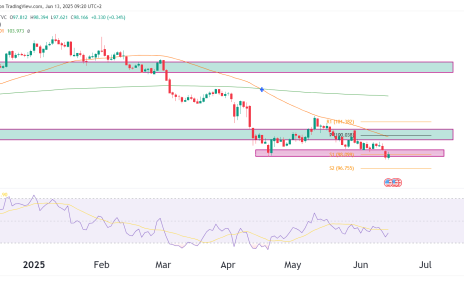- US retail sales increased by 0.6% in June, well above the forecast of 0.1%.
- The annual US CPI figure increased by 2.7%, exceeding the estimated 2.6%.
- The US signed a trade deal with Indonesia.
Interest futures rose on Friday after upbeat economic data in the previous session raised optimism about the state of the US economy. However, a decline in Fed rate cut bets and a rally in US Treasury yields put a lid on gains.
US retail sales (Source: US Department of Commerce)
Interest futures fluctuated on Thursday, ending in gains after data revealed robust consumer spending in the US. Retail sales increased by 0.6% in June, well above the forecast of 0.1%. At the same time, core retail sales increased by 0.5%, exceeding the estimated 0.3% rise.
Another report revealed that unemployment claims were significantly lower than expected at 221,000. The reports eased worries about the impact of Trump’s tariffs on the economy. It is clear that demand has rebounded. As a result, risk appetite improved, and interest futures edged higher.
However, there was also downward pressure on the bond market as Fed rate cut expectations eased. Initially, market participants were beginning to price the likelihood of a rate cut in July. However, that has changed. Moreover, the chances of a rate cut in September dropped to 54%. Higher interest rates for long are bullish for Treasury yields. Meanwhile, interest futures suffer.
The most significant decline occurred on Tuesday, following the release of data that showed consumer inflation was hotter than expected. The annual CPI figure increased by 2.7%, exceeding the estimated 2.6%. At the same time, it was a significant acceleration from the previous reading of 2.4%. Meanwhile, the monthly figure accelerated from 0.1% to 0.5%.
The inflation report confirmed the Fed’s fears that tariffs are boosting price pressures in the economy. Therefore, policymakers might choose to keep delaying rate cuts. This will hurt interest futures. It will also worsen the conflict between Trump and Powell.
On Wednesday, Treasury yields dropped after reports that Trump was planning to fire Powell. Such an outcome would mean a replacement who would lower borrowing costs. However, Trump denied the reports.
Meanwhile, traders are paying attention to trade developments as the August 1 deadline nears. There was optimism after the US signed a trade deal with Indonesia. At the same time, talks with other nations, such as the EU, are ongoing.



